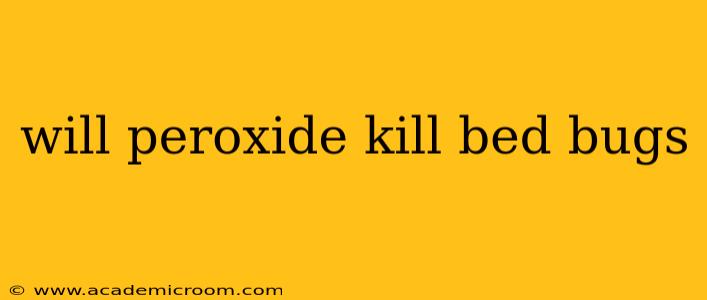Will Peroxide Kill Bed Bugs? A Deep Dive into Hydrogen Peroxide's Effectiveness
Hydrogen peroxide, a common household antiseptic, is often touted as a natural pest control solution. But does it truly work against bed bugs? The short answer is: it can, but it's not a reliable or comprehensive solution. While hydrogen peroxide possesses insecticidal properties, its effectiveness against bed bugs is limited and depends heavily on several factors. Let's delve deeper into the specifics.
How Does Hydrogen Peroxide Work Against Bed Bugs?
Hydrogen peroxide (H₂O₂) is a strong oxidizing agent. This means it readily releases oxygen, which can damage the cells of insects, including bed bugs. The released oxygen disrupts their cellular processes, leading to cell death. However, it's crucial to understand that this effect isn't immediate or guaranteed. The concentration of the peroxide and the method of application are critical to its efficacy.
Will a 3% Solution Kill Bed Bugs?
The typical concentration of hydrogen peroxide found in drugstores is 3%. While this concentration can kill some insects, it's unlikely to be effective against a significant bed bug infestation. 3% hydrogen peroxide might kill a few bed bugs upon direct contact, but it won't penetrate bedding or crevices where bed bugs typically hide. It’s simply not strong enough to be a reliable method of extermination.
What Concentration of Hydrogen Peroxide Kills Bed Bugs?
Higher concentrations of hydrogen peroxide (above 3%) are more effective at killing insects, but they also pose a greater risk to humans and pets. Using high-concentration hydrogen peroxide is strongly discouraged due to the potential for skin and eye irritation, damage to fabrics, and bleaching effects. The risks far outweigh the benefits in a home setting.
Can Hydrogen Peroxide Be Used as Part of a Bed Bug Treatment Plan?
Hydrogen peroxide might have a limited role as part of a broader bed bug treatment strategy. It could be used to spot-treat areas where you've seen bed bugs, but it shouldn't be your primary method of control. Think of it as a supplemental treatment, not a standalone solution.
What are Better Alternatives to Peroxide for Bed Bug Control?
For effective bed bug control, professional pest control services are usually recommended. They have access to powerful, registered insecticides and expertise in identifying infestation patterns and treating all affected areas. Other options include:
- Steam cleaning: High heat from steam can kill bed bugs and eggs.
- Encasements: Protective mattress and box spring encasements prevent bed bugs from accessing these areas.
- Diatomaceous earth: This natural powder dehydrates bed bugs, but requires consistent application and thorough coverage.
What Precautions Should I Take When Using Hydrogen Peroxide?
- Always test in an inconspicuous area: Before using hydrogen peroxide on any fabric, test it on a hidden area to check for discoloration or damage.
- Wear gloves and eye protection: Protect your skin and eyes from direct contact with hydrogen peroxide.
- Ventilate the area: Ensure good ventilation while using hydrogen peroxide to minimize inhalation of fumes.
- Keep out of reach of children and pets: Hydrogen peroxide can be harmful if ingested.
In conclusion, while hydrogen peroxide might kill some bed bugs upon direct contact, it is not a reliable or safe method for eradicating a full-blown infestation. For effective and thorough bed bug control, professional help is the best course of action. Using hydrogen peroxide should be considered only as a minor supplementary measure, and always with caution.
